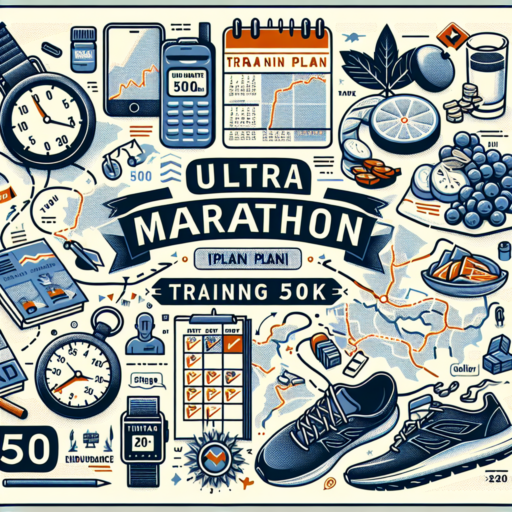No se han encontrado productos.
How to train for an ultra marathon 50k?
Training for an ultra-marathon, especially a 50k, requires a unique blend of endurance, strength, and mental preparedness. The journey to the starting line of a 50k ultra-marathon is both exhilarating and challenging. It involves more than just logging miles; it involves a dedicated strategy that encompasses various facets of training and preparation.
Building a Solid Base
Before delving into the specifics of 50k training, it’s crucial to establish a solid running base. This doesn’t mean you need to be running marathons regularly, but you should be comfortable with running longer distances at a consistent pace. Typically, a good base means you can handle 20-30 miles per week comfortably for a few months before ramping up your training intensity and mileage for the 50k.
Incorporating Strength Training and Cross-Training
Balancing your running with strength training and cross-training is vital for avoiding injuries and improving your overall fitness level. Strength exercises, particularly those focused on your core, legs, and back, will support the endurance your body needs for a 50k. Cross-training activities like biking, swimming, or even walking can help maintain your cardiovascular fitness while giving your running muscles a necessary break. These activities also contribute to building mental toughness, an essential component for ultra-marathon success.
Remember, training for a 50k ultra-marathon is as much about mental preparation as it is about physical readiness. Developing a routine, gradually increasing your mileage, and incorporating variety in your training will not only prepare you for the demands of an ultra but also ensure you enjoy the journey to the start line. Keep in mind, listening to your body and allowing for adequate rest and recovery is just as crucial as the training itself.
How many weeks to train for 50k?
The time it takes to prepare for a 50k race can vary significantly based on a runner’s starting fitness level, experience, and goals. However, a common and often recommended timeframe for building up to this challenging distance is approximately 16 to 24 weeks. This window allows runners not only to increase their mileage gradually but also to incorporate essential strength and cross-training workouts that can enhance performance and reduce injury risks.
Diving into the specifics of the training plan, the initial weeks are crucial for establishing a consistent running base. For individuals who already have a solid foundation of running approximately 20-30 miles per week, the lower end of the 16-week plan may be sufficient. Those starting with less experience or lower mileage may find more success with an extended duration towards the 24-week mark, allowing for a more gradual increase in distance and intensity.
Key Components of a 50k Training Plan
In structuring a training plan for a 50k, there are several critical components to consider. Long runs, often executed once a week, are the cornerstone of ultramarathon training, gradually increasing in length to build endurance. Recovery weeks, typically every fourth week, reduce mileage and intensity to allow the body to repair and strengthen. Incorporating speed work and hill sessions can also significantly improve a runner’s capacity to manage the varied terrain and challenges of a 50k event. Furthermore, emphasizing rest days and cross-training activities such as cycling or swimming helps prevent overuse injuries by diversifying the types of stress placed on the body.
Can you train for a 50k in 16 weeks?
Embarking on the journey to complete a 50k run is a formidable yet achievable goal. It may sound daunting, especially for those new to endurance running, but with the right approach and dedication, training for a 50k in 16 weeks is definitely within the realm of possibility. This timeframe allows for a gradual increase in distance, helping to minimize the risk of injury while building stamina and endurance.
Beginning Your Training
The initial weeks should focus on building a solid running base. This doesn’t mean jumping straight into high mileage but rather gradually increasing your running volume. Consistency is key during this phase, with three to four runs per week being ideal. Including cross-training activities such as cycling or swimming can also help build cardiovascular fitness without the extra stress on your legs.
Incorporating Long Runs
As your training progresses, long runs become crucial. These should be done at a slow, conversational pace to build endurance. A good rule of thumb is to increase your longest run by about 10% each week. This slow progression allows your body to adapt to the increasing demands without becoming overwhelmed, making it an effective strategy for building up to the full 50k distance.
Remember, while training for a 50k in 16 weeks is an ambitious goal, it’s important to listen to your body and adjust your training plan as needed. Rest days and proper nutrition play vital roles in your training, as they allow your body to recover and repair. With determination and careful planning, reaching the finish line of a 50k is an achievable dream.
How do you fuel a 50k ultra marathon?
Fueling a 50k ultra marathon requires both a strategic and flexible approach to ensure you not only make it to the finish line but do so in good health. It’s imperative to start fueling your body well before the day of the race and continue thoughtfully during the event. The key components involve a mix of hydration, energy sources, and electrolyte balance.
Pre-Race Nutrition
Preparation starts days before the event. Load up on complex carbohydrates, lean proteins, and healthy fats to ensure your glycogen stores are topped off. Foods like sweet potatoes, brown rice, oats, chicken, and fish are excellent sources. Hydration is also critical in the days leading up to the race, so increase your water intake and consider adding electrolyte beverages to your regimen.
During the Race
During the race, maintaining energy levels is paramount. Consuming 30-60 grams of carbohydrates per hour can help sustain your energy. Portable and easily digestible options like energy gels, chews, or even simple fruit like bananas are popular choices among runners. Hydration must also be maintained, with the aim being to drink 500-700ml of fluid per hour, depending on conditions. Electrolyte supplements or drinks should be consumed to replace losses from sweat.
Each runner’s body reacts differently to various fuels and conditions, so experimenting during training runs is essential to find what works best for you. Tailor your nutrition strategy to your personal needs, considering factors like sweat rate and gut tolerance to solids or liquids. Remembering that fueling for a 50k ultra marathon isn’t just about the race day itself, but a holistic approach starting well in advance, will ensure you’re adequately prepared for the challenge ahead.




